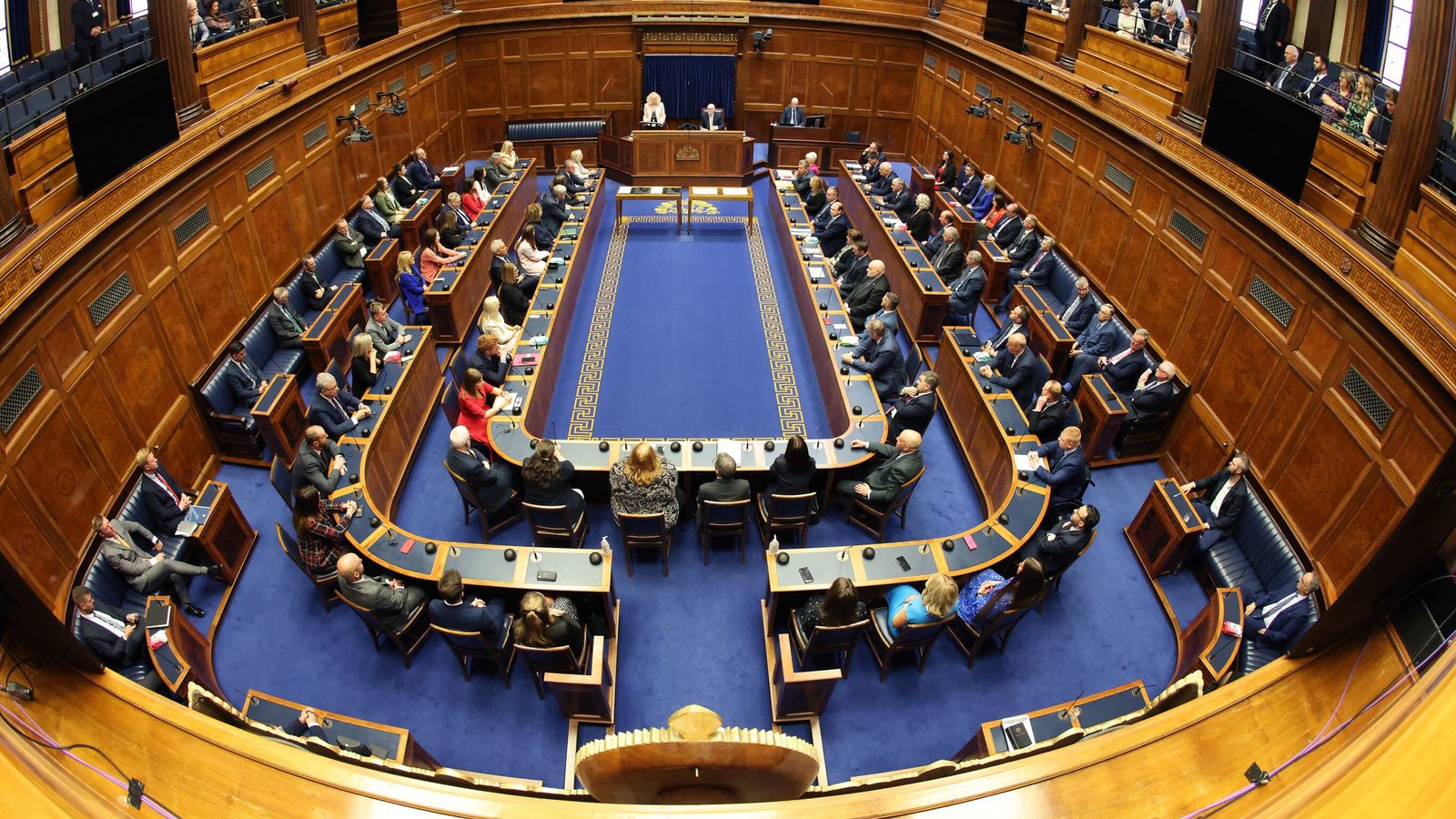Northern Ireland secretary says he will call Stormont election after attempts to restore executive fail

The UK’s Northern Ireland secretary has said he “will be calling an election” in the nation after a deadline to restore devolved government at Stormont passed at midnight.
Yesterday, last-ditch efforts to restore the multi-party executive failed and Northern Ireland Secretary Chris Heaton-Harris had been expected to subsequently call an election today and announce the date on which it would take place.
Speaking to broadcasters on Friday, Mr Heaton-Harris said he will provide an update on the snap Northern Ireland Assembly election next week, adding that talks with Stormont parties will continue.
There has been speculation the poll would be held on 15 December.
Sunak responds to criticism over ‘massive failure of leadership’ – latest updates
The Northern Ireland secretary added that he is “deeply disappointed” to now be faced with “limited options”.
“This is a really serious situation, as of a minute past midnight last night there are no longer ministers in office in the Northern Ireland Executive,” he said.
“I will take limited but necessary steps to ensure that public services do continue to run and to protect the public finances but there is a limit to what the secretary of state can do in these circumstances.”
He added: “I hear it when the parties say that they really do not want an election at all. But nearly all of them are parties who signed up to the rules, the law.
Advertisement
“That means I need to call an election so you’ll hear more from me on that particular point next week.”
Mr Heaton-Harris continued: “I have listened to the party leaders, I am going to talk to them all again next week. But I will be calling an election.
“Nearly all the parties who have been saying this won’t help the situation actually signed up to the rules that make this situation happen. Why call it now? Because I am legally bound to do so.”
Please use Chrome browser for a more accessible video player
2:09
‘Clock is ticking’ for Northern Ireland
With no ministerial executive in place, the UK government has a legal duty to call another election.
Stormont ministers, who have been operating in shadow form since the Assembly collapsed earlier this year, also ceased to hold office at midnight.
Senior civil servants will now have responsibility for running devolved departments – but their powers are limited.
SDLP leader Colum Eastwood urged Mr Heaton-Harris to drop the idea of an election and focus on restoring the Stormont institutions.
Read more:
Why is there still no assembly and what does Brexit have to do with it?
“The only thing proposing an early election achieved was prompting anger from the public who want politicians dealing with issues like the cost of living emergency and our crumbling health service, not knocking on their doors,” he said.
“What we really need is renewed negotiations between the British government and the EU to solve the small number of outstanding issues around the Protocol, while protecting the huge economic benefits, so they we can get the institutions up and running again.”
On Thursday, MLAs met during a recalled sitting of the Assembly in an attempt to elect a new speaker, but it did not go ahead as the DUP refused to support the nominations and the session was suspended.
The DUP’s boycott of the Stormont institution is part of a campaign of opposition to the NI Protocol, with the party claiming it will not return to power-sharing until decisive action is taken to remove economic barriers on trade between Great Britain and Northern Ireland.
Please use Chrome browser for a more accessible video player
2:47
NI heads towards a general election
The protocol has effectively placed a sea border between Great Britain and Northern Ireland after Brexit.
The government has vowed to secure changes to the protocol to empower ministers to scrap the arrangements without the approval of Brussels – either by a negotiated compromise with the EU or through proposed domestic legislation.
DUP leader Sir Jeffrey Donaldson said not enough progress has been made on addressing issues of concern around the protocol.
But Sinn Fein’s Stormont leader Michelle O’Neill said the DUP “have left us all at the mercy of a heartless and dysfunctional Tory government”.
Irish premier Michael Martin warned that elections “can lead to further polarisation”, adding that he “genuinely” believes there is a desire on behalf of the UK government and Mr Sunak to find a negotiated resolution to the protocol issues.
Another election could cost £6m, which would be unpopular during a cost of living crisis in the UK nation with the lowest disposable income and the highest energy prices.
As part of the 1998 Good Friday Agreement, Northern Ireland’s main parties must be part of a power-sharing agreement for the government to function.
The UK government has insisted it is not considering a joint authority arrangement with Dublin for the governance of Northern Ireland in the absence of the Stormont executive.